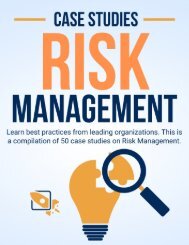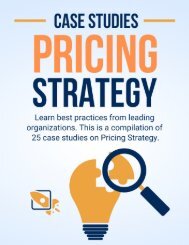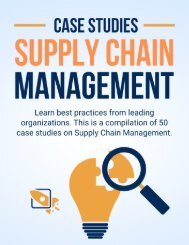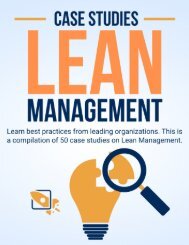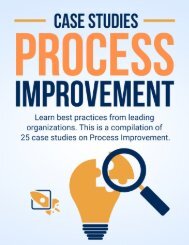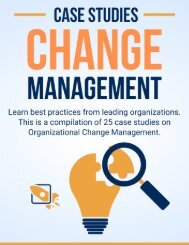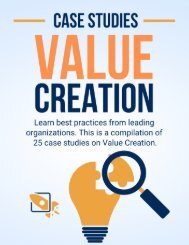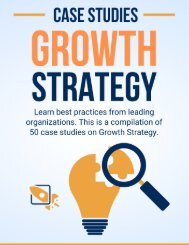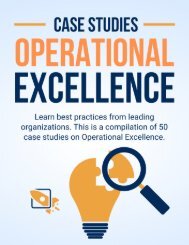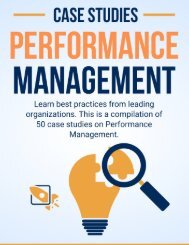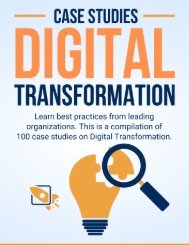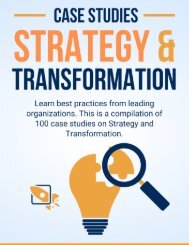Cracking the Consulting Code: Top 10 Digital Transformation Frameworks
Business frameworks and methodologies are structured tools to approach complex, but common business challenges. They allow us to cut through noise, zero in on the key issues, and facilitate the development of insightful recommendations. The importance and usefulness of business frameworks in the consulting world—especially among the global strategy firms—cannot be overstated. For consulting firms, these frameworks (https://flevy.com/top-100/consulting) are part of the bread and butter that enable them to consistently deliver value to client organizations across industries and geographies. Frameworks are helpful for several reasons: • They provide structured and detailed process for addressing the business challenge at hand. • They help ensure that the analysis is comprehensive and that critical aspects of a problem are thoroughly examined. • They accelerate the problem-solving process, as they allow consultants to apply proven methods and best practices, rather than reinventing the wheel each time or wasting time and effort pursuing dead ends. Consulting firms with extensive resources pioneer their own consulting frameworks through a combination of research, years of accumulated project experience, as well as subject matter expertise gathered from working across different sectors and functional areas. This development process is iterative and ongoing, with frameworks being continuously refined and updated to reflect new business realities and emerging best practices. Each global consulting firm maintains an internal knowledge management library of consulting framework presentations. At FlevyPro (https://flevy.com/pro), our team of former McKinsey and Big 4 consultants with several decades of combined experience have developed the largest publicly available knowledge base of consulting framework presentations, known as the FlevyPro Library. Each FlevyPro consulting framework presentation follows the standard “headline-body-bumper” design structure that is utilized by all the global strategy consulting firms. FlevyPro is currently used by 100s of consultants and business executives. Based on sales and downloads of the FlevyPro frameworks, here is what we found to be the top 10 Digital Transformation frameworks used by management consultants.
Business frameworks and methodologies are structured tools to approach complex, but common business challenges. They allow us to cut through noise, zero in on the key issues, and facilitate the development of insightful recommendations.
The importance and usefulness of business frameworks in the consulting world—especially among the global strategy firms—cannot be overstated. For consulting firms, these frameworks (https://flevy.com/top-100/consulting) are part of the bread and butter that enable them to consistently deliver value to client organizations across industries and geographies.
Frameworks are helpful for several reasons:
• They provide structured and detailed process for addressing the business challenge at hand.
• They help ensure that the analysis is comprehensive and that critical aspects of a problem are thoroughly examined.
• They accelerate the problem-solving process, as they allow consultants to apply proven methods and best practices, rather than reinventing the wheel each time or wasting time and effort pursuing dead ends.
Consulting firms with extensive resources pioneer their own consulting frameworks through a combination of research, years of accumulated project experience, as well as subject matter expertise gathered from working across different sectors and functional areas. This development process is iterative and ongoing, with frameworks being continuously refined and updated to reflect new business realities and emerging best practices. Each global consulting firm maintains an internal knowledge management library of consulting framework presentations.
At FlevyPro (https://flevy.com/pro), our team of former McKinsey and Big 4 consultants with several decades of combined experience have developed the largest publicly available knowledge base of consulting framework presentations, known as the FlevyPro Library. Each FlevyPro consulting framework presentation follows the standard “headline-body-bumper” design structure that is utilized by all the global strategy consulting firms.
FlevyPro is currently used by 100s of consultants and business executives. Based on sales and downloads of the FlevyPro frameworks, here is what we found to be the top 10 Digital Transformation frameworks used by management consultants.
Create successful ePaper yourself
Turn your PDF publications into a flip-book with our unique Google optimized e-Paper software.
3. <strong>Digital</strong> <strong>Transformation</strong> Governance<br />
The <strong>Digital</strong> <strong>Transformation</strong> Governance framework is designed to help executives navigate <strong>the</strong><br />
complexities of managing a portfolio of digital initiatives in a rapidly changing environment.<br />
Drawing on insights from a study of over <strong>10</strong>0 companies and interviews with 55 digital<br />
executives, this framework outlines 7 key governing principles that are critical for linking <strong>Digital</strong><br />
<strong>Transformation</strong> efforts to tangible success. These principles provide a balanced approach to<br />
centralizing and decentralizing control, fostering innovation, ensuring <strong>the</strong> effectiveness of<br />
digital initiatives, and maintaining alignment with <strong>the</strong> organization's broader goals.<br />
Organizations can leverage <strong>the</strong> <strong>Digital</strong> <strong>Transformation</strong> Governance framework to:<br />
1. Centralize Shared Information: Create a unified source of truth for information to<br />
enhance coordination and decision-making.<br />
2. Decentralize Governance Over Time: Allow flexibility and responsiveness by<br />
decentralizing <strong>the</strong> control of digital initiatives as <strong>the</strong>y evolve.<br />
3. Decentralize Ideation, Centralize Idea Evaluation: Encourage widespread innovation<br />
across <strong>the</strong> organization while maintaining a centralized process for assessing and<br />
selecting ideas for development.<br />
4. Ensure KPIs Measure True Impact: Develop Key Performance Indicators that<br />
accurately reflect <strong>the</strong> success and value of digital initiatives.<br />
5. Focus on Compatibility, Consistency, and Continuous Integration: Prioritize<br />
integration and standardization across digital efforts to ensure seamless operation and<br />
scalability.<br />
6. Implement a "Fit-for-Purpose" Mapping System: Tailor governance models to suit <strong>the</strong><br />
specific needs and stages of each digital initiative.<br />
7. Perform Scenario Analysis: Regularly analyze potential future scenarios to anticipate<br />
changes and adapt strategies accordingly.<br />
By following <strong>the</strong>se principles, digital leaders can enhance <strong>the</strong>ir ability to govern <strong>Digital</strong><br />
<strong>Transformation</strong> effectively, ensuring that initiatives are well-coordinated, aligned with strategic<br />
goals, and capable of adapting to <strong>the</strong> digital landscape's ever-changing nature.<br />
Adopting <strong>the</strong> <strong>Digital</strong> <strong>Transformation</strong> Governance framework offers several key benefits:<br />
• Enhanced Strategic Alignment: Ensures that digital initiatives are closely aligned with<br />
<strong>the</strong> organization's strategic objectives, maximizing <strong>the</strong>ir impact and value.<br />
Flevy Management Insights 8<br />
https://flevy.com<br />
© 2024 Copyright. Flevy LLC. All rights reserved. No part of this book may be reproduced in any form or by any electronic or<br />
mechanical means, including information storage and retrieval systems, without written permission from Flevy.



